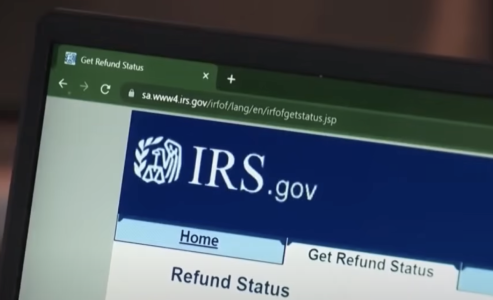Reminder: You could be one of those who lose out on $1,400 in stimulus money if you miss this deadline
By
Veronica E.
- Replies 0
Time is ticking, and a valuable financial opportunity could slip right through your fingers if you're not careful.
With the April 15 deadline fast approaching, millions of Americans have a chance to claim a crucial stimulus payment.
But here’s the catch: if you don’t act soon, you might miss out on this much-needed boost.
Let’s break down what you need to know before it’s too late.
Many may still not realize that the Recovery Rebate Credit could offer up to $1,400 per person—but only if they act now.
If you haven't yet filed your 2021 tax return, this could be your last chance to claim the aid you're entitled to.
With so much on the line, let's dive into what you need to know to make sure you don't miss out.

The Recovery Rebate Credit: A Brief Recap
In 2021, the Recovery Rebate Credit was introduced as part of a relief initiative following the peak of the coronavirus pandemic.
The Internal Revenue Service (IRS) distributed these funds to assist working Americans who faced financial hardships due to restrictions, business closures, social distancing, and other challenges.
As part of this credit, three rounds of Economic Impact Payments, also known as stimulus checks, were issued.
While the deadlines for the first two rounds have already passed, the deadline for the third round is quickly approaching.
The Clock Is Ticking: April 15, 2025 Deadline
The additional $1,400 is available only to those who missed submitting their 2021 tax return and were unable to receive the funds from the third round.
To claim this amount, they must file their 2021 tax return (along with the 2024 tax return) by the April 15, 2025 deadline.
This $1,400 is also a refundable credit, meaning it will either be applied to any outstanding taxes owed or refunded if there is no balance due.
Also read: Unclaimed stimulus checks await in 2025—check your eligibility now!
Income Matters: Who’s Eligible?
Keep in mind that the amount of the credit will vary based on adjusted gross income (AGI).
For instance, married couples filing jointly with a total AGI of $150,000 or less in 2021 could be eligible for up to $2,800.
However, those with an AGI of $160,000 or more will not qualify.
Dependents are also eligible for the $1,400, regardless of age.
Unclaimed Funds: A Billion-Dollar Concern
Did you know that approximately $1 billion in refunds and credits from 2021 remain unclaimed?
This staggering amount highlights how many eligible Americans may be missing out on vital financial relief.
Also read: Could DOGE play a role in your wallet? What this means for Americans’ savings
Maximizing Your Return: Don’t Overlook the EITC
In addition to the Recovery Rebate Credit, be sure to check if you qualify for the Earned Income Tax Credit (EITC).
This credit can provide an additional financial boost, with some taxpayers qualifying for up to $6,728.
The EITC is particularly beneficial for moderate to low-income taxpayers with children.
The amount of the Earned Income Tax Credit (EITC) depends on your AGI and filing status, whether you’re single, married filing jointly, married filing separately, head of household, or a qualifying surviving spouse.
To qualify for the EITC, several other conditions must be met. These include being a US citizen or resident alien for the entire 2021 tax year, possessing a valid Social Security number, and having investment income below a specified limit, among other requirements.
Additionally, EITC is available for the 2024 tax return when filed by April 15. Some taxpayers could receive up to $7,830 from the EITC.
All current and past year tax forms, along with detailed instructions, are available on the IRS website through the Forms & Instructions page.
Also read: Tax season chaos: What’s delaying your refund now?
Navigating Tax Season: Tips and Tools
Tax season officially began on January 27, and with the April 15 deadline fast approaching, it's essential to file on time to avoid penalties.
If you need more time, you can file Form 4868 to request an extension, giving you until October 15 to submit your return.
Also, remember that the IRS offers a handy online tool called "Where's My Refund?" to track your refund status, which you can use once your return is filed electronically.
At The GrayVine, we understand how important financial security is, especially during challenging times.
Review your tax situation, consider claiming the Recovery Rebate Credit and the EITC, and be sure to file your 2021 tax return before the April 15, 2025, deadline!
Read next: How a disabled woman lost her last $400 to an expiry scam—protect your money now!

We’d love to hear from you: Have you already claimed your stimulus checks? Do you have any tips for navigating tax season? Share your thoughts and experiences in the comments below, and let’s help each other stay informed and financially savvy.
With the April 15 deadline fast approaching, millions of Americans have a chance to claim a crucial stimulus payment.
But here’s the catch: if you don’t act soon, you might miss out on this much-needed boost.
Let’s break down what you need to know before it’s too late.
Many may still not realize that the Recovery Rebate Credit could offer up to $1,400 per person—but only if they act now.
If you haven't yet filed your 2021 tax return, this could be your last chance to claim the aid you're entitled to.
With so much on the line, let's dive into what you need to know to make sure you don't miss out.

Make sure you don't miss important tax credits–act before the deadline! Image Source: YouTube / Action News Now.
The Recovery Rebate Credit: A Brief Recap
In 2021, the Recovery Rebate Credit was introduced as part of a relief initiative following the peak of the coronavirus pandemic.
The Internal Revenue Service (IRS) distributed these funds to assist working Americans who faced financial hardships due to restrictions, business closures, social distancing, and other challenges.
As part of this credit, three rounds of Economic Impact Payments, also known as stimulus checks, were issued.
While the deadlines for the first two rounds have already passed, the deadline for the third round is quickly approaching.
The Clock Is Ticking: April 15, 2025 Deadline
The additional $1,400 is available only to those who missed submitting their 2021 tax return and were unable to receive the funds from the third round.
To claim this amount, they must file their 2021 tax return (along with the 2024 tax return) by the April 15, 2025 deadline.
This $1,400 is also a refundable credit, meaning it will either be applied to any outstanding taxes owed or refunded if there is no balance due.
Also read: Unclaimed stimulus checks await in 2025—check your eligibility now!
Income Matters: Who’s Eligible?
Keep in mind that the amount of the credit will vary based on adjusted gross income (AGI).
For instance, married couples filing jointly with a total AGI of $150,000 or less in 2021 could be eligible for up to $2,800.
However, those with an AGI of $160,000 or more will not qualify.
Dependents are also eligible for the $1,400, regardless of age.
Unclaimed Funds: A Billion-Dollar Concern
Did you know that approximately $1 billion in refunds and credits from 2021 remain unclaimed?
This staggering amount highlights how many eligible Americans may be missing out on vital financial relief.
Also read: Could DOGE play a role in your wallet? What this means for Americans’ savings
Maximizing Your Return: Don’t Overlook the EITC
In addition to the Recovery Rebate Credit, be sure to check if you qualify for the Earned Income Tax Credit (EITC).
This credit can provide an additional financial boost, with some taxpayers qualifying for up to $6,728.
The EITC is particularly beneficial for moderate to low-income taxpayers with children.
The amount of the Earned Income Tax Credit (EITC) depends on your AGI and filing status, whether you’re single, married filing jointly, married filing separately, head of household, or a qualifying surviving spouse.
To qualify for the EITC, several other conditions must be met. These include being a US citizen or resident alien for the entire 2021 tax year, possessing a valid Social Security number, and having investment income below a specified limit, among other requirements.
Additionally, EITC is available for the 2024 tax return when filed by April 15. Some taxpayers could receive up to $7,830 from the EITC.
All current and past year tax forms, along with detailed instructions, are available on the IRS website through the Forms & Instructions page.
Also read: Tax season chaos: What’s delaying your refund now?
Navigating Tax Season: Tips and Tools
Tax season officially began on January 27, and with the April 15 deadline fast approaching, it's essential to file on time to avoid penalties.
If you need more time, you can file Form 4868 to request an extension, giving you until October 15 to submit your return.
Also, remember that the IRS offers a handy online tool called "Where's My Refund?" to track your refund status, which you can use once your return is filed electronically.
At The GrayVine, we understand how important financial security is, especially during challenging times.
Review your tax situation, consider claiming the Recovery Rebate Credit and the EITC, and be sure to file your 2021 tax return before the April 15, 2025, deadline!
Read next: How a disabled woman lost her last $400 to an expiry scam—protect your money now!
Key Takeaways
- Americans who did not submit their 2021 tax return need to act by April 15, 2025, to claim their $1,400 Recovery Rebate Credit.
- The rebate is part of a relief program following the coronavirus pandemic and is distributed by the IRS.
- The Recovery Rebate Credit is a refundable credit, which will be applied against any taxes owed or refunded if no taxes are owed.
- Taxpayers should also be aware of the Earned Income Tax Credit (EITC), which could provide additional funds, and should file for an extension by April 15 if they cannot meet the filing deadline.
We’d love to hear from you: Have you already claimed your stimulus checks? Do you have any tips for navigating tax season? Share your thoughts and experiences in the comments below, and let’s help each other stay informed and financially savvy.






